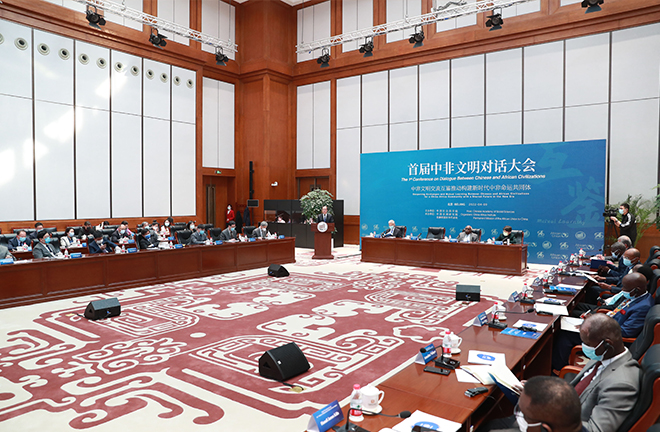CASS hosts First Conference on Dialogue Between Chinese and African Civilizations

The 1st Conference on Dialogue Between Chinese and African Civilizations, hosted by the Chinese Academy of Social Sciences, is convened in Beijing on April 9. Photo: Zhu Gaolei/CSST
The 1st Conference on Dialogue Between Chinese and African Civilizations, hosted by the Chinese Academy of Social Sciences (CASS), was convened in Beijing on April 9.
Under the theme of “Deepening Exchanges and Mutual Learning Between Chinese and African Civilizations for a China-Africa Community with a Shared Future in the New Era,” Chinese and African participants attended the conference via both offline and online channels.
CASS Secretary General Zhao Qi pointed out that exchanges and mutual learning among different civilizations are an important driving force for the progress of human civilization and the world’s peaceful development. Both China and Africa have splendid civilizations, and both Chinese and African civilizations are important components of world civilization. The two major civilizations of China and Africa treat each other as equals, and seek common ground while reserving differences. The two express tolerance and complement each other, while practicing the concept of civilizations’ harmonious coexistence, setting an example for exchanges and mutual learning among world civilizations.
Rahmat Allah Mohamed Osman, permanent representative of the African Union Representative Office in China, said that in the 21st century, global problems are becoming more prominent, and countries and regions are facing huge challenges in their development. Informatization, networking, and digital technologies are developing rapidly, and a civilization’s discourse power is increasingly important. The exchanges and mutual learning among civilizations have become an important foundation and approach for human development.
Although the African continent and China are far from each other, their civilizations’ exchanges have a long history, he continued. Since the beginning of the 21st century, exchanges and mutual learning between Chinese and African civilizations have been greatly enriched and developed through China-Africa friendly cooperation, especially as exhibited in the Forum on China-Africa Cooperation (FOCAC), which has become one of the five pillars of the China-Africa comprehensive strategic cooperative partnership.
Xing Guangcheng, director of the Institute of Chinese Borderland Studies at CASS, said that mutual learning among civilizations is a basic feature of human history. China and Africa face many common development problems, and their development interests and demands are highly compatible.
In a special period when China-Africa cooperation has entered a new era of deepening development and mankind is facing non-traditional security challenges, such as the COVID-19 pandemic, the convening of the conference has special academic significance and realistic applications, said Zhang Yuyan, director of the Institute of World Economics and Politics at CASS.
The COVID-19 pandemic has brought enormous challenges to the economic and social development of China and Africa, and has also created opportunities for the two sides to deepen cooperation. In the early stage of the pandemic, the Executive Council of the African Union issued a communiqué to support China’s COVID-19 response. China has provided multiple batches of emergency supplies and vaccine assistance to African countries, and supported Africa’s post-pandemic reconstruction.
At the opening ceremony of the 8th Ministerial Conference of the FOCAC, Chinese President Xi Jinping announced that China will provide another one billion doses of vaccines to Africa. This is the largest medical assistance provided by a single country to Africa, said Peter Kagwanja, director of the Africa Policy Institute in Kenya.
Kagwanja continued, noting that China-Africa cooperation and common development in the new era are based on the long-standing history of exchanges and cultural ties, with the FOCAC and the Belt and Road as the two major starting points. Anti-pandemic, public health, climate change, and regional security governance are becoming new topics of China-Africa cooperation, with increasing prominence.
China-Africa cooperation is based on complete equality and mutual benefit, rather than charity from one side to the other, said Ethiopian Ambassador to China Teshome Toga. China is willing to share its own successful experience of development with Africa. At the same time, China fully respects the independence and strategic choices of African countries, and does not interfere in the internal affairs of African countries, he said.
The ambassador expressed his hope that this kind of cooperation can continue to help Africa develop faster and better in terms of the economy, and science and technology.